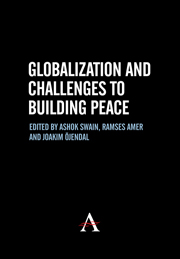Book contents
- Frontmatter
- Contents
- Acknowledgements
- List of Contributors
- 1 Building Peace in the Era of Three Waves
- 2 The Problem of Peace: Understanding the ‘Liberal Peace’
- 3 Pre-emptive Self-defence New Legal Principle or Political Action?
- 4 Beyond Criminal Justice: Promoting the Rule of Law in Post-Conflict Societies
- 5 Peace by Pact: Data on the Implementation of Peace Agreements
- 6 Refugee Repatriation as a Necessary Condition for Peace
- 7 Catapulting Conflicts or Propelling Peace: Diasporas and Civil Wars
- 8 UN Peace Operations as Norm Entrepreneurs: The Challenge of Achieving Communicative Action on Human Rights
- 9 To Practice What They Preach: International Transitional Administrations and the Paradox of Norm Promotion
- 10 Re-examining the Roots of War in West Africa in a Globalizing World
- 11 The African Union (AU) and Its Commitment to Non-Indifference: Can the AU be an Actor for the Promotion of Human Security?
- 12 Hamas Between Sharia Rule and Demo-Islam
- 13 Environmental Scarcity and Intrastate Conflicts: The Case of Nepal
- 14 Narcotics: The New Security Threat for China
- References
- Bibliography
12 - Hamas Between Sharia Rule and Demo-Islam
Published online by Cambridge University Press: 05 March 2012
- Frontmatter
- Contents
- Acknowledgements
- List of Contributors
- 1 Building Peace in the Era of Three Waves
- 2 The Problem of Peace: Understanding the ‘Liberal Peace’
- 3 Pre-emptive Self-defence New Legal Principle or Political Action?
- 4 Beyond Criminal Justice: Promoting the Rule of Law in Post-Conflict Societies
- 5 Peace by Pact: Data on the Implementation of Peace Agreements
- 6 Refugee Repatriation as a Necessary Condition for Peace
- 7 Catapulting Conflicts or Propelling Peace: Diasporas and Civil Wars
- 8 UN Peace Operations as Norm Entrepreneurs: The Challenge of Achieving Communicative Action on Human Rights
- 9 To Practice What They Preach: International Transitional Administrations and the Paradox of Norm Promotion
- 10 Re-examining the Roots of War in West Africa in a Globalizing World
- 11 The African Union (AU) and Its Commitment to Non-Indifference: Can the AU be an Actor for the Promotion of Human Security?
- 12 Hamas Between Sharia Rule and Demo-Islam
- 13 Environmental Scarcity and Intrastate Conflicts: The Case of Nepal
- 14 Narcotics: The New Security Threat for China
- References
- Bibliography
Summary
[D]emocracy is inside Islam, there is no conflict between Islam and the democracy.
(Interview with Hamas leader, 14 October 1997)We do not wish to throw them into the sea… If Israel declares that it will give the Palestinian people a state and give them back all their rights, then we are ready to recognize them. (From an interview with Ismail Hanyeh, Prime Minister of the PA, 26 February 2006. http://www.washingtonpost.com)
This chapter examines the vexed issue of the place for Arab Islamic movements, such as Palestinian Hamas – The Islamic Resistance Movement – within democracy and democratic peace. Some analysts would claim that Arab Islamic movements have no place within democracy, due to Islam's inherent incompatibility with democracy (see Sörensen, 1993; Huntington, 1993; Tibi, 1998; Kramer, 2001; Spencer, 2005). Spencer asserts that in Islamic law, all non-Muslims are considered inferior to Muslims. Another claim often aired is that Islam constitutes a threat to the basic values of the West, including its democratic mode of governance. Others contradict these claims, highlighting democratic, grassroots level structures that Islamic organizations have built throughout history (Esposito and Voll, 1996; Midlarsky, 1998). Furthermore, the democratic popular political culture of the (mostly) religious Arab masses, in contrast with the undemocratic political structures of their governing regimes, forms the setting within which Islamists must act. (Goddard, 2002; Tessler, 2002; Inglehart, 2004) Hamas's election victory in January 2006, handing it control of the Palestinian parliament, is the first time that an Arab Islamist party has ascended to power democratically in the Arab world.
- Type
- Chapter
- Information
- Globalization and Challenges to Building Peace , pp. 195 - 212Publisher: Anthem PressPrint publication year: 2007

